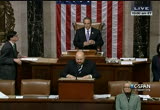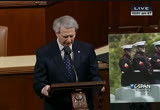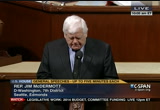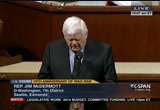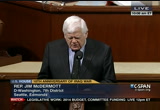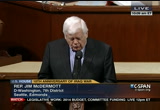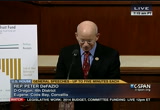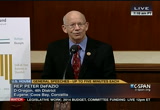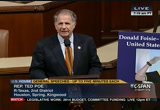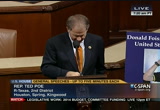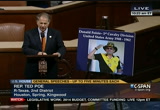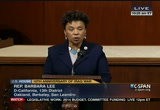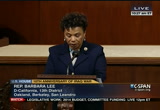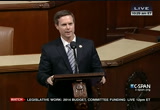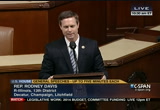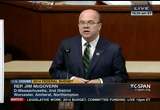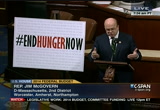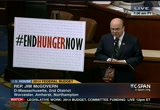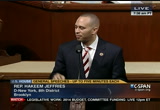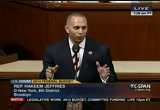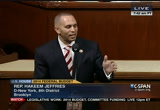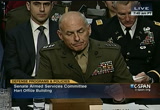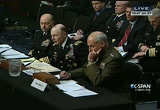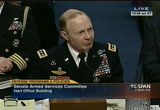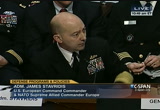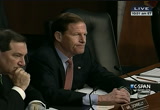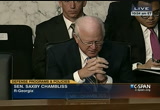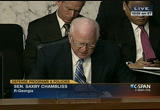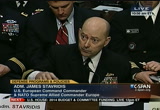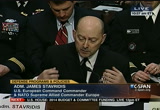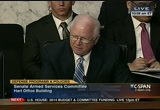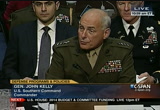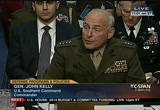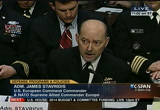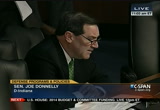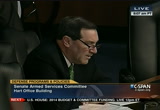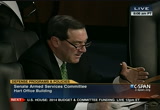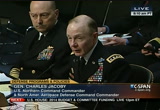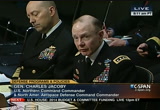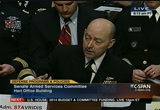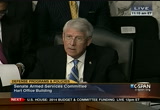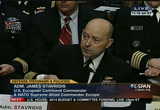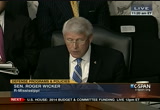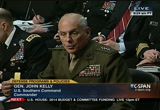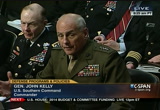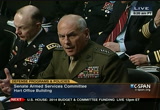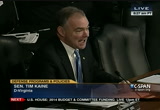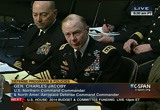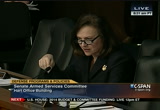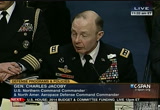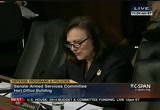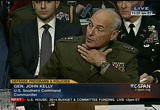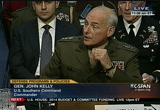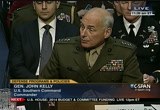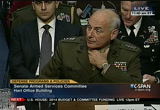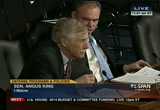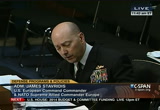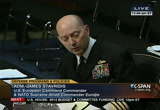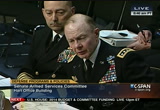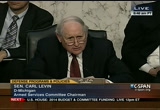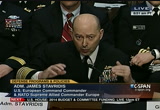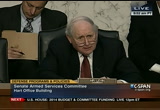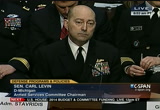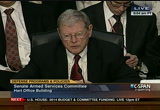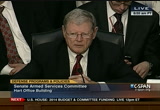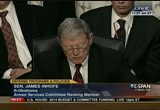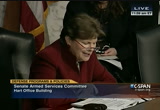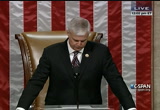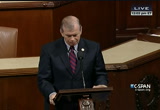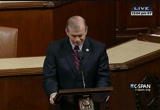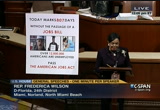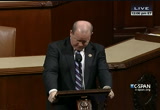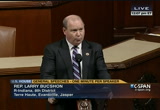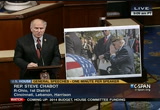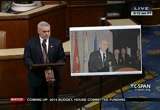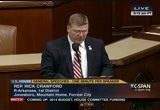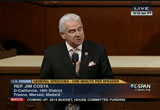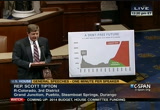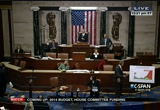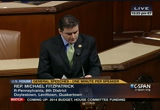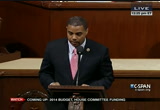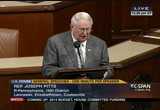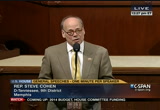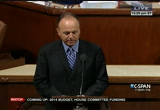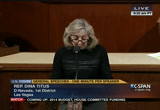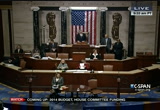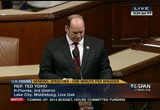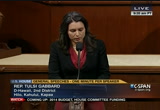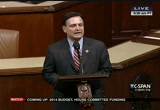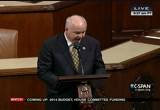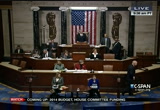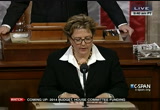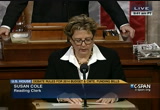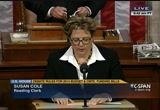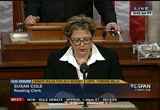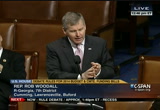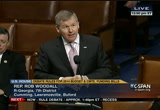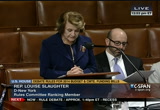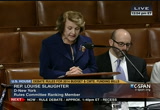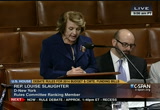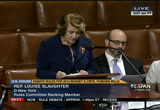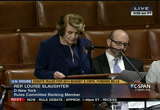tv Public Affairs CSPAN March 19, 2013 10:00am-1:00pm EDT
10:00 am
guest: they have made the decision to integrate. i don't know exactly what happens after that. it will depend on how smoothly the integration goes. as we have heard from your and theseor viewers callers, women have always been involved in the military, so this is just a little different level of engagement. we will see whether that raises any questions. host: thank you for talking to our viewers this morning. live coverage of the house next. [captioning performed by national captioning institute] [captions copyright national cable satellite corp. 2013] the clerk: the speaker's room, washington, d.c., march 19, 2013. i hereby appoint the honorable chris collins to act as speaker pro tempore on this day. signed, john a. boehner, speaker of the house of representatives. the speaker pro tempore: pursuant to the order of the house of january 3, 2013, the chair will now recognize members from lists submitted by
10:01 am
the majority and minority leaders for morning hour ebate. the chair will alternate recognition between the parties with each party limited to one hour and each member other than the majority and minority leaders and the minority whip each, to five minutes but in no event shall debate continue beyond 11:50 a.m. the chair now recognizes the gentleman from north carolina, mr. jones, for five minutes. mr. jones: mr. speaker, thank you very much. this week is the 10th anniversary of the unsess war in iraq -- unnecessary war in iraq. i urge my fellow americans and the public to watch msnbc documentary titled "the selling of the iraq war" friday night of this week at 9:00. the documentary sheds light on the manipulated intelligence that got us into iraq. unfortunately we have not
10:02 am
learned from all we lost in iraq. as president obama has also committed us to an additional 10 years in afghanistan, thanks to a strategic security agreement he made without congress voting on it or even debating it. this weekend i read two articles that really spoke to the corruption happening in afghanistan. one was an a.p. article i read in my hometown paper titled "u.s. helicopter crashes in afghanistan killing one" and the other is from "the new york times" titled "afghans protest u.s. special forces: complaints about night rage spark calls for withdrawal." i'll quote from the first article. the crash has come as united states officials are grappling with tough talk from president karzai whose recent anti-american rhetoric has complicated relations at a time when international troops are withdrawing from the war. the article continues saying, karzai stated this week by accusing the united states and the taliban of being in
10:03 am
conclusion on two daily suicide bombings last weekend in an effort to create instability and give security forces an excuse to stay. karzai is one person we cannot trust and yet we are funding him $8 billion a month. "the new york times" article stated that karzai issued a statement that referred to u.s. forces in afghanistan as infidels, echoing language used by the taliban. mr. speaker, i just do not understand why more members of the house are not more concerned about president obama's 10-year security agreement to keep our troops in afghanistan until 2024, 10 more years after 2014, 2024. it makes absolutely no sense. we are financially broke as a nation. i'm currently in the process of finding out how exactly how much money is going to cost the american taxpayer to keep our troops in this corrupt country for another decade past 2014. whether the cost is $1 or $1
10:04 am
trillion is too much. congresswoman rossa delauro and i introduced h.r. 125, congressional oversight of afghanistan agreement act of 2013, to make sure that the president does not bypass congress as he continues to do but give us a chance to debate any security agreement that will keep our troops in afghanistan past 2014. mr. speaker, it is our job as representatives to make sure the voices of the american people is being heard and it's only fair we have a debate in congress on how our country's future involvement with afghanistan, how long it will continue. mr. speaker, as always, i always bring down a poster that shows the cost of war. in this case you can see these marines, mr. speaker, carrying coffin, a flag--- flag-draped coffin. how many more coffins will be
10:05 am
carried? when the american people pulls our troops out of afghanistan, it is too long to be there until 2024. it is too long to be there until 2014. god please wake up congress to please bring our troops home. i yield back the balance of my time. the speaker pro tempore: the chair recognizes the gentleman from washington, mr. mcdermott, for five minutes. mr. mcdermott: mr. speaker, although i rise to honor the 10th anniversary of the iraq war, what i do want to do today is ask why. 10 years ago today i stood on this floor and said we were entering a war under false pretenses. no weapons of mass destruction later, i've never been so sad as to be right. we took out saddam hussein with as much forethought as we gave to arming him of just a few years earlier. we scooped him out of office and thought a new democracy would suddenly flower in its
10:06 am
place. last week robert wrote an argue in "the nation" that i'd like to enter into the congressional record and i ask unanimous consent. the speaker pro tempore: without objection. mr. mcdermott: he explains that the c.i.a. is currently training syrian rebels, some of whom have sunni fundamentalist ties, at the same time it is fighting sunni rebels in iraq. recently dozens of syrian soldiers fled to iraq only to be killed by iraqi sunnis. he asked the question, when will the united states learn that it doesn't know enough about the middle east to go charging in there seemingly without a clue about what it all means? here we are 10 years of neo conservative hawks preaching we can franchise american democracy and freedom, 10 years of quick sand democracy, so years of wrong answers and we
10:07 am
still don't know the question. what has been the cost of all this? and i don't mean financially. because, yes, we've spent probably $1 trillion or more on this war or will. yes, as we speak we are cutting food assistance to kids in this country and funding for r&d will drive our economy, but we can't appropriate a sum of money to fix the real cost of iraq. can't pay back the lives of 4,486 american men and women who have died there or the roughly 2,000 broken soldiers who came home and took their own lives. the wounded, physically and mentally, the soldiers who didn't know how not to be a soldier, the families living with a hole in their hearts and the families living with someone they no longer recognize.
10:08 am
10 years leaving their families, living in hell, coming home to unemployment and the homelessness, to a country that's forgotten that it's at war at all, to a country that seems to think a yellow ribbon magnet on their bumper is the only kind of support that oir troops need and the cost in iraq, untold deaths. let me rephrase that. unknown deaths. we can only guess at the destruction that we have left in our wake. 115,000 iraqis, 600,000, you can find the number, what was the long-term impact of that on the environment, the water and health? what happens when someone lives in constant fear of becoming collateral damage? today iraq is a sad shadow of a society that once boasted the best infrastructure in the region, instability and violence fester on this very day and now it teeters on the
10:09 am
brink of an inevitable civil war. this is the legacy of our last 10 years, and i still don't understand why. i hope this anniversary will remind us that a whole new generation of veterans are waiting to help reintegrate into the civilian life. i believe it's time to elevate our level of commitment to these veterans. i'm introducing a bill to create a commission on veterans' care, to investigate what we as a society can do to help our men and women come home. i hope it will remind us that no lives, regardless of nationality, should be taken lightly. i hope it will remind us as to why the next time. and i hope it won't take another war to get that answer. i yield back the balance of my time. the speaker pro tempore: the chair recognizes the gentleman from montana, mr. daines, for five minutes. mr. daines: i ask unanimous
10:10 am
consent to address the house and to revise and extend my remarks. the speaker pro tempore: without objection. mr. speaker, i arrived here in washington, d.c., to serve the people of montana and my country with a bit of a different resume than many folks have here in washington. you see, i've spent the past 28 years in the private sector working to grow businesses, having to balance a budget and create good jobs. i loved my job in the private sector. but when i looked at washington and the path our economy and our country was on, i knew that things needed to change. so i ran for congress because the challenges facing our nation were far too great to just sit back on the sidelines. as montana's small businesses know, you can't spend more than you take in.
10:11 am
year after year of federal deficits with no end in sight doesn't lead to prosperity, doesn't lead to growth. it leads to financial ruin. i'm also the father of four great kids, two in college and two in high school. they know that as a family they have to plan ahead for the future. we need to create a budget and then live within our means. these are the same principles that my parents past down to me. -- passed down to me. these are the values that montana's families live by each and every day. those values are exemplified in montana's own state legislature. we're the only constitutionally -- where the only constitutionally required duletty is passing a budget. in -- duty is passing a budget. in fact, when they adjourn in a little over a montana, they will have given montana a balanced budget, just like they did last year and the year before and the year before that. it seems simple -- live within your means, spend no more than
10:12 am
you take in, but it's not so easy here in washington. right now we are presented with two very different visions for our country, two visions that will lead to two very different outcomes for this country. one vision calls for more taxes taken out of the pockets of hardworking american families, more government spending which adds to the trillions of dollars in debt that will be handed down to the next generation. our friends on the other side of the aisle talk about a balanced approach, but they refuse to even balance their own budget. our vision calls for a stop to washington's failed policies and reckless spending. it says american families and small businesses understand you can't spend more than you take in. you need to balance your budget, and it's time for washington to do the same. this vision seeks to protect the things that we value most, to keep the promises we made to our seniors, to our veterans.
10:13 am
i'm the son of a u.s. marine. while at the same time allowing us to leave a better future for our kids and our grandkids, that's the vision i want to work toward and that's why i'm proud to support the house budget committee's proposal which we'll be voting on later this week. this isn't about passing a budget for one year, just one time. this is about creating lasting solutions that help grow our economy and put our country back on track. that's what this budget will do. thank you and i yield my time. the speaker pro tempore: the chair recognizes the gentleman from oregon, mr. defazio, for ive minutes. mr. defazio: thank you, mr. speaker. as i speak here on the floor,
10:14 am
the american society of civil engineers is releasing a report card for america's infrastructure. the gentleman who spoke before me talked about the legacy that would leave to our country and about growth in the nation. well, this is an incredible legacy we're leaving and creating which is an unbelievable deficit in our nation's infrastructure. we've gone from number one in the world, post-world war ii with the eisenhower era, national interstate program, to number 26 in the world. we're spending less of our gross domestic product on infrastructure investment than many third world countries. it's not only an embarrassment, it is hurting our economy and our growth. now, if your kid came home and said, hey, dad, guess what, got my report card, here it is. good news. good news. oh, it's good news.
10:15 am
i went up to a d-plus. d-plus. yep, that's where america's infrastructure is. we have a projected deficit over the next seven years of about $1.6 trillion. now, that's an unbelievable, unimaginable number, $1 trillion. $1.6 trillion. that's as much money as the war in iraq cost us, an unnecessary and wasteful war. . we can't afford to invest in our infrastructure, but we are rebuilding the infrastructure in afghanistan. something wrong with this picture. now, here we have according to the american society of civil engineers that if we don't address this investment gap in all of our infrastructure by 2020, the economy will lose $1 rillion in business sales, 3.5 million jobs will be lost or foregone, $3.1 trillion less in
10:16 am
gross domestic product. that is, if we invested $1. trillion, we would get 100% return on our investment and 3.5 million more jobs. not bad, but the people on that side of the aisle don't believe in rebuilding america's infrastructure. they have some whacko theory here of what they call devolution. we shouldn't have a national transportation policy. no. it should be done by the 50 states. we already tried that. didn't work too well. that's what quite david eisenhower said we need a national interstate system and we built it. now it's falling apart. 140,000 bridges need substantial repair or replacement. 40% of the pavement on the national highway system is at the point where potholes are big enough to put your car in. maybe if the white house limousine falls in one of those holes we'll get more action down there in terms of funding our infrastructure. i have been trying to get them to take a position on this.
10:17 am
we are looking at something even more extraordinary. in 2015, we have been paying for infrastructure out of a trust fund, hasn't added to the deficit, but it raises taxes. we can't have taxes for something like that. not object that side of the aisle. if we don't do something about t. the trust fund will drop behe low zero some time in 2014, which means we are not going to invest any more in our national transportation system. for one year we'll go from $50 billion which is not sufficient to even deal with the deterioration let alone build out a better, more efficient 21st century infrastructure, to $7 billion. that's hundreds of thousands of jobs gone. that's an acceleration in the deterioration of the system. we are going to have to talk about revenue. it's the only way to solve that problem. unless you want to devolve it to the 50 states and have states build interstates that won't match up or maybe they won't
10:18 am
build them at all. we don't know under what kind of plan is coming from that side of the aisle. i do know that we need to make these investments. and as i already pointed out, we get 100% rate return. it's simple. we have the gas tax which hasn't changed since 1993. the money is going into the covers of exxon, mobile, and other big oil companies. it isn't going to repair infrastructure. haven't raised that tax in 20 years. so if we just indexed it to construction cost inflation, and indexed it to the economy, we could issue bonds, pay it off by that increment on the gas tax. it would be about a penny a year a gallon. i was driving to work one day they were changing the cards up there. they were raising it a nickel a gallon as i drove by. a penny a gallon. i think most americans would be willing to pay for that if they knew it was going to save 3.5 -- or create 3.5 million jobs and put this country back on track
10:19 am
and get rid of some of the delays and congestion and detours and all the other problems we have. so let's pay attention to this scorecard. to this report card. if your kid came home with a card like this you'd do something about it. congress better do something about it. the speaker pro tempore: the chair recognizes the gentleman from texas, mr. poe, for five minutes. it was mr. speaker, june, 1950, when the north koreans decided they would invade their neighbors to the south, south korea. the war had started even he though the world community called it a police action. but it was a war. and of course south korea was in trouble. they called 9-1-1 and as has been in history when you called 9-1-1 the united states answers.
10:20 am
the americans went to south korea to protect our ally south korea. in august of the same year, some americans were occupying hill number 303, most americans never heard of hill 303. let me tell you about it. hill 303 was being occupied by the second battalion, 5th cavalry reg. of the united states army. it was a small group because america didn't have a lot of troops in south korea. we weren't ready for this war. the north koreans with the aid of the communist chinese later overran the hill and the americans, some stayed, some withdrew. one of the individuals who stayed on that hill was a friend f mine by the name of donald foisie. donald and his other comrades refused to give ground. the hill was overrun. the north koreans took the hill.
10:21 am
donald and one of his friends hid in a rice paddy. used bamboo canes to get air. they stayed there for a long time. unbeknownst to him, 45 other american soldiers had been captured by the north koreans. and how they were captured, they were lined up in front of a ditch, not handcuffed but their hands tied behind their backs, and they were machine-gunned down in that gully. later the americans retook the hill. found donald and found his murdered comrades. that was in august of 1950. things haven't changed much in the koreas. the north koreans still have sights on south korea, but that's another story. donald foisie was wounded several times, received the purple heart that day. he stayed in the united states army until 1962. he came back to texas down the street from me and he had
10:22 am
several businesses. he worked for a corporation in houston. that corporation was an international corporation and from time to time they would fly the flag of the country that -- they were hosting that day. when donald foisie saw one of those flags that one day he he was working was the red chinese, as he called them, communist flag, he refused to go to work. he didn't believe the chinese flag ought to fly on america's soil. that's the kind of guy he was. he spent the rest of his life letting americans know about the korean war. last year he was at treatwood middle stool in houston, where the middle school kid honored the veterans of hill 303, those that were murdered, and had a memorial. he was there along with many south koreans and ambassador parks from south korea and myself were there. last year also he attended the memorial day service to veterans cemetery in houston, this is
10:23 am
where that photograph was taken. he was saluting the crowd who had given him a standing ovation after his story was told. several thousand. you see, he looks pretty good. he's 81 in this photograph. and this week donald foisie, united states army, first cavalier division, still wearing his hat, died. he will be buried at the same cemetery he was standing in honoring memorial day, this friday. he was quite a guy. he was married to rita. he had three kids. donna, daniel, and david. he wrote several books. he was in the air conditioning business. he worked as a security guard when his knees got bad. but he spent most of his life letting america know about his buddies in korea in 1950. the forgotten war, as he called it. he wants us to remember about what occurred many years ago when young americans, kids, went over to lands they had never
10:24 am
seen and fought for people they had never known all in the name of securing liberty in america's interest. we today, we honor sergeant foisie and his family for his service in the united states army for being a true patriot, a true american, a great texan, and a person who never gave ground. that's just the way it is. i yield back. the speaker pro tempore: the chair recognizes the gentlewoman from california, ms. lee, for five minutes. ms. lee: thank you, mr. speaker. today is a solemn anniversary. a tragedy that began 10 years ago when president george w. bush launched a war of choice in iraq. dragging our country into a costly, bitter conflict based on falsehoods and hyperbole. it took president obama fulfilling his campaign promise to end the iraq war and we are grateful that he brought the war to an end.
10:25 am
but we must not forget how we got into the war in the first place. so that these mistakes are not repeated. we were told there were weapons of mass destruction. we were warned about mushroom clouds. now i offered an amendment at the time that would have taken us down a different path. it would have required the united states to work through the united nations inspectors and maximizing diplomacy to determine whether or not iraq was developing weapons of mass destruction. unfortunately my amendment failed by a vote of 72-355. what happened from there we all know the tragic consequences. president bush dragged this country into an unnecessary war. no weapons of mass destruction were ever found. the cost of the iraq war soared far beyond what was projected. we lost 4,400 american troops in iraq and over 32,000 were wounded, not to mention iraqis. once the war started, many of us
10:26 am
in congress quickly organized. led by congresswoman maxine waters and my good friend, former congresswoman, lynn woolsey, and myself, we founded the out of iraq caucus. over 80 members joined. thankfully on may 25, 2005, congresswoman woolsey introduced the first amendment to bring our troops home. from what i remember there were about 132 votes. the -- but that -- that was not enough to stop the war. it was our way, though, to join the hundreds of thousands of people who marched in protest to what they knew was a war based on misleading information by the bush administration. and many in this house supported my amendment every year to cut the funding for combat operations and only appropriate funding for the safe and orderly drawl of our troops and our contractors. we would have saved hundreds of lives had this body used the power of the pursestrings to stop this war. shame on us. 10 years later today, the full
10:27 am
consequences and cost of the iraq war remain to be seen. according to a new study by the watson institute at brown university, the war in iraq has cost $1.7 trillion, with an additional $490 billion in benefits owed to our veterans. most importantly we paid for this war most tragically in the loss of life and injury. we poured billions of dollars into nation building in iraq with little oversight or accountability. the special investigators general -- inspector general for iraq reconstruction issued his final report to congress last month detailing billions of dollars, billions of united states tax dollars lost to waste, fraud, and abuse. speaking with an iraqi official, special insector, stuart was told, you can fly in a helicopter around baghdad and other cities, but you cannot point a finger to a single project that was built and completed by the united states. mr. speaker, unfortunately these
10:28 am
lost opportunities and tragic mistakes are not behind us. as the daughter of a 25-year veteran of the armed forces, i recognize the sacrifices our young men and women have made in iraq and continue to make in afghanistan. i am deeply concerned with the widespread incidences of ptsd and the alarming suicide rates among our returning veterans. we need to honor our troops who served and show our support by giving our o men and women who served the best health care, the best educational opportunities, and the best job available. they deserve nothing less. it is my hope that this reckless and shortsighted decision will mark a turning point in american history and that that we will never again wage an unnecessary war. we must use all the tools of america's power in resolving disputes, including diplomacy. we must have sufficient congressional debate. we only debated this go to war resolution probably a couple hours. we need more debate and oversight before ever putting another u.s. soldier in harm's
10:29 am
way. finally, mr. speaker, just like in iraq, there is no military solution in afghanistan. we need to bring the war in afghanistan to an accelerated end and to bring our troops home now. dr. martin luther king jr. in expressing his sentiment during a different war said, the bombs in vietnam exploded home. they destroy the hopes and possibilities of a decent america. let us put this decade of perpetual warfare behind us, invest in our veterans, our children, and get about the business of nation building here at home. thank you. i yield the balance of my time. the speaker pro tempore: the chair recognizes the gentleman from illinois, mr. davis, for ive minutes. mr. davis: thank you, mr. speaker. every time i walk on to this floor, it is such an honor and a privilege to be able to represent the great citizens of central and southwestern illinois. the citizens that have given me the opportunity that humbles me
10:30 am
every time we walkthrough those doors and every time we are able to stand here in this institution and offer what our visions for america are. there are vast differences in our visions for america between many parties. there are fortunately, though, a lot of similarities and our willingness to begin working together to craft a vision for america that the hardworking taxpayers of this country want and deserve. . but another great honor that this institution allows is a-- giving us an opportunity to talk about the many things that those in our districts do on a regular basis that they don't ask for recognition. they just do it because it's the right thing to do. and that's why today i stand here, mr. speaker, i want to
10:31 am
congratulate dr. joseph of decatur, illinois, for being honored by the american medical association for his 50-year anniversary of graduation from medical school. while his dedication and commitment to the medical profession through the years is a tremendous accomplishment, i'd be remiss if i didn't take this opportunity to also thank him for all he and his family have done for the entire decatur area. his contributions to the community are too many to mention, but his advocacy and hard work on behalf of students and education is something we should all strive to emulate. whether it was his time spent serving on his board of my alma mater or the richland community college foundation board or he and his late wife, martha's, work to see the health education wing at the community
10:32 am
college come to fruition, his impact on the decatur area will be felt for generations. so i take this time today, mr. speaker, to offer my thanks to the doctor and his family for all they have done and all they continue to do and offer my heart felt congratulations to him for this tremendous accomplishment. i'd like to take this opportunity, mr. speaker, to yield back. the speaker pro tempore: the chair recognizes the gentleman from massachusetts, mr. mcgovern, for five minutes. mr. speaker, budget resolutions are moral documents. they lay out a vision of how each party sees the future and where our priorities should lie. since this is budget week, a week on where we'll vote on different opinions for america,
10:33 am
it's time to talk about the misguided priorities laid out in the republican budget as presented by chairman paul ryan. once again chirme ryan has proposed a budget that guts low-income program. the ryan budget not only does not end hunger now, it actually makes hunger in america worse than it is today. simply put, mr. speaker, we are currently not doing enough to end hunger now. there are over 50 million hungry americans in this country, 17 million are kids. over 47 million rely on snap, formerly known as food stamps, to put today food on their tables. without this program, real hunger, the actual absence of food, would be actually worse. the great recession is the primary reason hunger is so bad today. now, don't get me wrong, hunger has been getting worse since the presidency of ronald reagan. we almost eradicated hunger in america in the late 1970's, but hunger has been getting steadily worse in the decades since. but the great recession, the worst economic period we've
10:34 am
faced since the great depression, resulted in millions more people hungry. millions of people who had to turn to snap as the safety net that prevented them from going without word altogether. now, recognizing that hunger is a real problem and we need to end hunger now, i would hope that any budget proposed in this congress would at the very least do no harm for those that are struggling the most in our economy. yet, the ryan budget slashes snap once again. this should come as no surprise. this is basically the same budget he's introduced over the past few years and the same budget that voters have rejected over again and again. yes, mr. speaker, this is the same budget that turns medicare into a voucher, the same budget that repeals the affordable care act and the same budget that gives even more tax breaks to the wealthiest americans. and mr. speaker, it's the same budget that turns snap into a block grant. now, some of my republican friends will provide false arguments about what the ryan budget really does. they'll say that this just
10:35 am
gives governors flexibility or they're just combating fraud, waste and abuse. mr. speaker, the real goal of the ryan budget and of some of my republican colleagues who support it, is to end snap as we know it. snap is not just a simple anti-hunger program. it is among the most effective and efficient, if not the most effective and efficient federal program. snap has a historically low error rate. trafficking is going down, and prosecutions of snap trafficking are clearly visible as usda works to reduce their problem. snap is a countercyclical program. that means it is a true safety net program and has a side benefit of being a stimulus program. every snap dollar spent results in $1.72 in economic activity. yes, snap can use some improving, but the wholesale and shortsighted changes in the ryan budget are not the answer.
10:36 am
the rhine budget cuts $135 -- the ryan budget cuts $135 billion over the next 10 years. $135 billion. that's not a haircut. it's a meat ax. it will cause harm to low-income families who otherwise could not afford food. the cuts in the ryan bument will have a real impact on poor -- budget will have a real impact on poor americans because people that are on snap earn so little they can get assistance. if they apply these cuts to sole eligibility, that would mean eight million to nine million people will be cut from snap. all the people on snap would see an average cut of $24 per person per month. that adds up to a cut of almost $1,100 per year for a family of four. that may not seem like a lot to a congress that has millionaires, but a real cut will do harm to american
10:37 am
people. cuts like these are not just misguided. they're cruel. combining cuts to other low-income programs that are included in the ryan budget, these snap cuts will absolutely make hunger in america worse. now, as we consider a budget at the very least we should do no harm. but we really should be striving to make every american's life better. that's our job. cutting snap not only don't make anybody's life better, it actually does real harm, harm that will manifest in a less educated population, a sicker nation and a nation that ultimately has to spend more on the hungry because we didn't bring austerity to a program that deserves not to be cut. we are a great country, mr. speaker. we are great because we have a tradition of caring about the most vulnerable among us. let us not turn our backs on one of our greatest tradition. this is solved on poor people ust come to -- this assault on peer people must come to an end. mr. speaker, i believe that we can -- poor people must come to an end.
10:38 am
mr. speaker, i believe we can end hunger if we find the political will to do so. the ryan budget cuts an anti-hunger program and makes hunger worse. let's instead pass a budget that lifts people up, not one that keeps people down. i yield back the balance of my time. the speaker pro tempore: the chair recognizes the gentleman from new york, mr. jeffries, for five minutes. mr. jeffries: mr. speaker, this is decision time in america. we are at a fork in the road and we have an opportunity to go either one of two directions. in one direction, the democratic approach, we can take a balance approach to dealing with the economic situation that we find ourselves in and our deficit. the other direction, the g.o.p. approach, is to balance the budget on the backs of the most vulnerable amongst us.
10:39 am
the democratic plan will put americans back to work. the republican plan will put americans out of work. it's decision time in america. we can go in one of two directions. now, a balanced approach to deficit reduction has at least four elements to it. first, invest in the american economy. second, increase revenues by closing corporate loopholes that are unfair, unreasonable and unnecessary. third, we can reduce expenditures in a manner that is sensitive to the fragile nature of our economic recovery. we must reduce expenditures in a way that recognizes we still
10:40 am
have a long way to go in order to recover, and the meat cleaver approach advocated by my friends on the other side of he aisle will not make the situation better. it will just make the situation worse. lastly, the democratic approach, the balanced approach stands for important social safety net programs like social security, medicare and medicaid that have nothing to do with the economic situation that we find ourselves in right now. why should we invest in the american economy? well, we don't have an immediate deficit crisis in america right now. we've cut $2.5 trillion from our deficit over the last several years, and we're
10:41 am
prepared on this side of the aisle to reasonably do more. but don't overhype the problem. in fact, objective economists have indicated we don't have an immediate deficit problem in america right now. the speaker of the house of representatives has conceded that we don't have an immediate deficit crisis in america right now. just on sunday the chairman of the budget committee acknowledged that we don't have an immediate deficit crisis in america right now. that's why we're pursuing a balanced approach. what we do have is a jobs crisis. over the last four years under the leadership of president obama we have come a long way. almost six million private sector jobs added, but we still
10:42 am
of course have a long way to go. let's just look at the landscape. corporate profits are way up. the stock market is way up. the productivity of the american worker is way up. yet, unemployment remains stubbornly high and consumer demand remains stagnant. that's why the democratic approach is to invest in our economy, invest in education, invest in job training, invest n transportation and infrastructure, invest in research and development, invest in technology and innovation, invest to take to make america a leader in the 21st century. if you invest in our economy,
10:43 am
then you'll increase jobs for the american worker. if you increase the jobs available to the american worker, consumer demand will increase. if consumer demand increases, the economy will grow, and if the economy grows, the deficit will decline and so too will our debt as a percentage of g.d.p. this is decision time in america, and clearly the best decision that we can make is a balanced approach to dealing with our economic problems today. the speaker pro tempore: pursuant to clause 12-a of rule 1, the chair declares the house in recess until noon today.
10:44 am
>> we began providing televised access to the every day workings of congress and the tell -- and the federal government. c-span, created by table companies -- cable companies. >> on c-span we will take you live to capitol hill where the senate armed services committee is holding a hearing with the top military officials. in a are looking into budget
10:45 am
requests from the military command. last week chuck hagel announced they will spend $1 billion in addition to add 14 interceptors on the west coast to the u.s. defense system. >> what more can and should the united states do in your command and others? >> if you are speaking about drugs, more assets. locating, weood at understand the network. i can always speak to that. we understand the network very well. have all sorts of airplanes from any airplane. once we identify them we can then tell them to pick up. the drivers of the
10:46 am
boats, can turn that. they enter our legal justice system. condors in guatemala are extremely helpful to us. honduras and guatemala are extremely helpful to us. they are with us. more assets equal more tonnage, less assets equaled less tonnage. illegale pursue the drug trafficking question with a question about human trafficking. that is the flow of people who are exploited either with bad working conditions there or in this country, a sex exploitation and so forth. to what extent has that been a concern? what measures can be taken? taken it
10:47 am
>> we watch an awful lot of flow that comes in from the middle east. we watch the traffic pattern in latin america and then they disappear in the united states. it is efficient. anything that gets on the network if you can pay for it has a pretty good chance of getting through. i look at high value, high interest people. you do not pay a lot of money to come to pakistan and give up in the united states. we are not talking about people who are economic refugees for they have other businesses. >> i think the thing all of this illicit activity has in common, whether it is people, drugs, money, or weapons this has grown
10:48 am
in size and capacity and ruthlessness. the agility to find the vulnerabilities across our broad frontier. are goodn nations that partners with us, central and south america, europe, and mexico. they are exploiting weak institutions or vulnerabilities that exist. closely,king at this and we talk about this a lot, more steps we take to put pressure to disrupt and speech
11:00 am
11:01 am
11:02 am
short term. i was not a proposal -- not a proponent of the start treaty because it did not address tactical nuclear weapons. the russians, we know, have continued to not increase their arsenal, certainly modernize their inventory of tactical weapons. what information can you give vs.elative to the tactical strategic by the russians? russians continue to have a significant inventory of tactical nuclear weapons. it is part of their planning and theory. i would like to come back again with a classified answer that would give you a little more detail, but it is a concern and i watch it closely from the nato perspective. >> follow up with us on that.
11:03 am
>> i will, sir. >> thank you. >> thank you, mr. chairman, and it thank you, a gentleman for your service. that on to allss the men and women who are in harm's way every day because they don't always hear it, but they sure are the ones to protect our freedom. general kelly, you had talked about the criminal networks we're facing. it is our law enforcement combined with the military facing these criminal networks. are these nations who are working with the criminal networks on the other side who are partners with them in a number of these efforts, and what can be done in regards to that? whoever wants to take the first crack at that.
11:04 am
>> with the exception of a couple of possibilities, i'm positive there are no government -- there are no governments that are supportive, but there are high officials within governments that are supportive. many of them for their own personal corruption purposes, but i think a few of them to make life a little more difficult for the united states. i don't want to get into the detail in an open hearing. think john is absolutely correct. this points to another real concern about these networks. on ourt just the impact population and youth using narcotics, the profits are used to corrupt officials and that undermines these fragile
11:05 am
democracies. nameld be hard pressed to a state that was an identified narcos state. there are officials throughout the region and certainly afghanistan involved in this. it is extremely pernicious. do countries like iran or north korea have a working relationship with them? > i will speak to iran and -- not as far as state policy. strong and effective counter narcotics effort. i know that because it on the border with afghanistan and we have the ability to understand what's going on there. if you ask that the e a, iran can be very effective. hand, in all of
11:06 am
these states in the region, people who are in the process for financial gain. >> in regards to syria, is there a fear or is there planning as d falls,d when assa fears of ethnic cleansing or religious cleansing? >> there is a great deal of danger in the endgame scenario in syria. i'm not a serious expert. that is general madison. i watch it because of my native that. the closest analogue i can give you is think back to the balkans in the 1990's. we had competing ethnic turned thes that balkans into a nightmare for the better part of 10 years. we saw 100,000 killed, 2 million
11:07 am
people pushed across borders, to significant awards, one in bosnia heard segovia and one in serbia and kosovo. everyk there is possibility for revenge killing, religious conflict between the various segments of the religious population and it's difficult to see the pieces of syria going back together very easily. little bit of an overall general question. what do you see other than the cyber discussions, what is the greatest threat to our nation? my mind, it's the trafficking network that drug is right on and people ride on and
11:08 am
potentially weapons of mass destruction. of manyern on the part of our latin american friends that we are withdrawing and there's a lack of interest and are part to continue doing what we're doing. they want this in their lives for the most part. even the ones who don't like us so much, in the drug trade and in trade in general. those are the two issues. >> as we look forward, one of the discussions on the budget and are all the facilities whereary as we look at the danger is coming from in the years ahead? do you believe our efforts will result in a smaller u.s.
11:09 am
footprint or is that something where having the flexibility where changes would be made, would that be of assistance to you? >> yes and yes are the two quick answers. so yearscall 20 or in, we had 450,000 troops europe. 1200 basis. we have come down 85% since then. we have taken a great deal of infrastructure out of europe. what remains are forward operating basis we need for access into africa, the near middle east and central asia. having said that, we should look at the basing structure. we have a steady in progress that will report out.
11:10 am
trot down aly could bit further. it will depend on partnerships, , and how wedence move in the nato alliance. there is room for continuing analysis. i feel we are content to it -- we are about right for the moment but that downward trajectory over time will continue. what do you see as the greatest threat as we look forward? other than the cyber peace we deal with every day. >> as i said in my opening statement, we have increased vulnerability in the homeland. there's a bigger difference in the home game and away game than ever before. i worry about my area of
11:11 am
responsibility. i have interest in all the others as well. weapons of mass destruction -- a weapon of mass destruction getting into the homeland is any commanders nightmare. where would that come from? what route would it take? what organizations would sponsor it? what threat would seek to deliver a device like that? connected to all the others in agency. we can't take our eye off the still remained determined to attack -- to attack the united states. hasterrorist threat manifested itself in various successnd we have had preventing an attack in the united states.
11:12 am
homeland ise in the something that increasingly occupies my attention. we have had three major hurricanes, two major wildfires, and hurricane sandy being the worst of those, those are times where the expectations for the people of the department of defense are going to provide expectations. service. ou for your thank you. >> thank you. >> let me do a little follow-up. if and when assad falls, you talked about ethnic cleansing.
11:13 am
the have contingency plans to deal with the syrian stockpile of weapons? comm does not. anythingu tell us about that? >> not on a non-classified level. >> thank you very much. senator mccain had an interesting question with regard to patriot batteries in turkey. who put those there? mission and on nato assigned by the nato alliance. is there. states place inn a
11:14 am
southwestern turkey along the border. reachedhis a decision ?y the nato leadership >> it was a native decision in this was a nato mission. those are the nations that contributed the actual batteries, the 28 member nations have people who are part of this. command and control is made up from people from all the different companies -- different countries, but it's very much a nato mission. >> what does it take for nato to make that decision? >> we had to bring it to the nato council, which is 28 nations represented by ambassadors in belgium. it was discussed there and then the ambassadors went back to capitols and got approval for
11:15 am
11:24 am
be >> to really be disruptive in terms of the drug markets, you would have to interject about 70% of the cocaine coming in. a the president has given us goal of 40%. the thinking there is if you took that much cocaine out of the flow, the network wouldn't have the profits. the network itself would suffer because of the profits. >> it would also drive up prices. assets and surface
11:25 am
assets, more takes more of the market and less takes less of the market. we could take much more than the 40% the president has asked us to take off. is the usemponent of ships, primarily on the caribbean side. you have about six ships you currently use that would be part of the normal interdiction force? -- the coast guard plays on the caribbean side. they aree see it, crippled in the effort of the trends that sound. -- south comm being the area
11:26 am
of force, we only have a relatively small number of coast guard cutters and u.s. navy ships of all types. isthe five or six now jeopardized by sequester to drop it down to 0 or 1? >> yes. >> while drugs are interdicted by the surface ships, they are the key component? >> overwhelmingly. the example i would give is the product that is flown primarily at of venezuela by small into thetypically goes and governed as bases, it might carry a ton. is so lucrative that they land and then just turn the airplane.
11:27 am
the vast majority of the tonnages taken off the high seas. i have to point out with partnerships, the french are involved, the british are involved. i can't say enough about the colombians and what they do. has improved with the current government. columbia is getting to be a stronger and stronger partner every day. >> they are. asone of the concerns is they see an upscale of activity in china and may be an upscale from russia and iran, they sense we are pulling back. we talked yesterday about a small example. the inter-american defense college here that has trained
11:28 am
military officers from the hemisphere who have gone back and assumed key positions militarily or even in civilian political leadership. that's a small line-item but something that is jeopardized by our current budget woes? >> yes. the american defense college here in washington doesn't work for me, but they graduate somewhere in the neighborhood of 25 undergraduates. many of them have become generals come officers, admirals', presidents, ministers of defense. it's a very effective program and it's all about civilian control of military and the relationship between the military and the people of their countries. it's all about human rights and is very effective. it may go under if we do not find them $800,000, which i don't have. startinge chinese are to bring the military leadership from the hemisphere to china for
11:29 am
military checkrein, correct? what they do. they have a wide-open program. for the chinese, it is much easier. if you want to go, you could go. a lot of officers from latin america go. they don't get much out of it, but it is when you're abroad. we have similar programs in the united states, and they're very popular down south. isay, the president of peru a former graduate as a military officer from the old school of the americas. but that is gone now and we now have the program in fort benning. he found it to be so useful to him that he is buying up every seat he can get in the western hemisphere course of instruction. the dividends are immense, but there are -- there are a few hurdles in order to get students up into our programs.
11:30 am
this includes attendance at schools the marines run at it'sico, the air force -- all of the schools in the united states. relationships are key. >> i don't believe we can afford to send the message we're pulling back. in the same part of the world, talk about the relationship with mexico. report we haveo a strong military to military relationship with mexico. it is a relatively recent phenomenon. i have been involved with mexico over the last decade and it's really in the last three or four years that the military to military engagement has become a rich exchange between equals and we are developing a great partnership. we changed administrations in mexico and i know that to head,man who are at the
11:31 am
tremendous professional officers and eager to sustain and grow their relationship. beneficialy, very thing for both countries to do that and i am proud of what we accomplished. >> thank you very much. senator fisher? >> thank you, a gentleman, for being here. thank you for your service and i hope he will extend my appreciation to the men and . men you represent general jacoby, according to certain reports, iran could have a ballistic missile capable of striking the united states in 2015. earlier this morning, senator levin had a conversation with you about the threat to the east coast, and you discussed that. the closerid
11:32 am
relationship between a home game we have anly game -- closer relationship between a home game and away game than ever before. how long would it take to construct a missile defense site on the east coast? >> it is a pretty complicated proposition. from the study is required, environmental impact statements, and depending on the site, it could be an issue of years to get another missile site than on the east coast or wherever it might be. it is quite a proposition and to that end, we are happy to be to providethe study decision points along the way to make sure we are outpacing the threat. my home state, in
11:33 am
highway construction, an environmental impact statement can take five to seven years. with that apply to a missile site as well? >> i do have experience in these things and can take years to get an environmental impact statement. that could be affected by urgency of the increased threat, but it safe to say this is a question of years. getting the study started is a good and important step. if the iranians are to have a system that can reach the east coast by 2015, are we already behind? >> as i testified, we are able to provide the defense of the entire united states from an iranian threat. currently, we don't think that threat is -- that threat has resolved itself yet, but it is my belief iran is actively
11:34 am
pursuing an icbm capability. it is prudent to take steps to hedge against the evolution of that threat. deployedhe missile be by 2015? >> that would not be part of the homeland defense. >> it will be. that is the current plan and it will be deployed in europe. >> will that help with defense of the homeland? >> it would not. it is strictly for defending our allies in europe. >> thank you. friday, we learn the pentagon made a decision to eliminate the deployment of those interceptors in europe. is that correct? >> yes. that was announced on friday. >> how does that affect europe, and how would that affect the united states? does it make the east coast more vulnerable?
11:35 am
you said it doesn't apply to that united states, but would it make the east coast more vulnerable? >> the theory of the phase for thehat it would defend united states. is they haveened the secretary of defense has moved these capabilities to the ground-based interceptor site you were just discussing. it will not affect europe. >> thank you. >> general kelly, in your opening statement, you said china is attempting to compete with u.s. military activities in the region. you are asked about the chinese influence that you mentioned the
11:36 am
economic influence. can you elaborate on that? >> the chinese, first and foremost, are very active in latin america commercially. when they want to buy something, they buy it in very large numbers, whether it soybean in the far south, oil from venezuela, they are there in a big way buying up commodities, primarily. and they're very good at building things like forts and running things like ports and the running of the panama canal is a good example. they are doing a commercially and economically. they deploy a house battleship to the region, much like our own hospital ship.
11:37 am
it is a tremendous goodwill visit. they did thousands of medical procedures on people who never did a doctor. obviously, they want to sell their military hardware to any nation that will buy it. it's much easier. you know the frustration our friends and partners have. its very complicated and takes a long time. i would offer many of these countries get tired of waiting. they would rather buy american stuff because it is better, better maintained and comes with better support packages, but they get tired of waiting for it, say that -- so they go elsewhere waiting for the russians. sell theirying to
11:38 am
equipment. we mentioned the training programs where they will pay for officers to go to china and do a year in staff colleges. is the ultimate goal? commercially, there's huge, powerful and they are going to penetrate any market they can penetrate. looking to the un and they have certain agenda items that if they could get more votes in the un, they might get those agenda items. as we back away and it's harder for people to buy military equipment, they go to easier to deal with countries, and china is one of them. >> which countries are being most effective by the chinese
11:39 am
influence? >> economically, and the company down there. commodities, farm products, things like that. i don't think there is a soybean safe in latin america that's not going to be scooped up and sent to china. oil from venezuela and some of those countries -- think good trading partners with a company willing to trade, undercut things and make things happen. but if we want to remain a partner of choice, we are certainly doing that the military to military level and the law enforcement level. help many countries deal with their drug problems and money laundering problems, but there are other aspects of
11:40 am
national instruments of power that other countries have replaced s or have enjoyed success in replacing us. picking upindustry, the slack there in maintaining that influence and being good trading partners with those countries, with that diminish the threat of the chinese? there are still restrictions on what u.s. private businesses can do, who a hoops to get through and hurdles to jump. it's much easier when you deal with a country that has no restrictions and will do business with anyone for any reason. >> thank you. >> admiral, i am sorry you are
11:41 am
leaving as i am coming in and we don't get a chance to work together. just mentiony you that perked my ears up, what is the chinese involvement in the management of the panama canal? >> they have commercial managers and companies that work either and. >> chinese personnel are managing it? there are chinese personnel there? >> the have managers and personnel. there are many panamanians involved in the process as well. they have contractual arrangements on either end of the canal. >> thank you. on the question of sequestered, there has been all lot of questions. one of the potential ameliorations is greater flexibility to the departments
11:42 am
of defense in terms of how what is going to be achieved. not reducing the overall now, but how it is going to be achieved. thed that help or are amounts so significant that it would not be a great boon to respond to this issue? >> i think that would be very helpful. i am not the right person to claim on that. it's a question for our budget tears. i could see where it would be helpful and allow for movement across various accounts so we could better prioritize, which is what you would want us to be able to do. >> you guys would agree? >> different question. benghazi and forces in europe in
11:43 am
a time of reducing footprints. is there a middle ground that would allow for smaller strike forces to respond to a situation like benghazi as opposed to maintaining a large footprint? >> it is not and on and off switch. life is a rheostat and you dial in. i am generally satisfied with the level of infrastructure we have in europe which has come down 85% since the height of the cold war. but there are studies in progress this year and by the end of this year, you will see reported to the committee and congress ideas for how we can get the best balance on that rheostat. >> one of the issues we discussed his response time.
11:44 am
if you move everyone to fort benning, it will be hard to get there. >> i would not recommend coming out at that level. we need these forward operating bases in the 21st century because of all the things we talked about. >> part of what i am suggesting is not a full-blown base but a much smaller strike force in the neighborhood. is that a feasible option? >> all of those ideas could be explored. it would depend on our partners. we would rely even more on the italians, greeks and more. i'm comfortable with the arrangements we have, but it is worth considering all options to get the best balance and best position for security. >> we are trying to hit a lot of
11:45 am
areas. you have all mentioned the criminal network, and i was interested -- how organized and a unified is it? this is reminding me of the old james bond books in the '70s where there was a criminal network that was organized that had a boss and a set of underlings and a structure. is that what we are dealing with or are we dealing with a bunch of read the bad guys? >> it is somewhere in the middle. that are a large cartels operate around these criminal networks. this is the dark side of globalization. isa world in which there much more connection and ability to move people quickly, that's generally a good day, but there will be entities and individuals, midsize group said big cartels that take advantage of this.
11:46 am
the globalk of economy as being about $60 trillion, some estimates are that about $6 trillion, about 10% of the global economy is invested in narcotics, human smuggling, as well as the other things we have talked about, arms cache, etc.. >> you have mentioned cyber crime and we don't have time to get into the detail, but i view that as the next pearl harbor risk. do you share that concern? >> yes, i would. panetta spokery about it in just those terms. tremendous opportunities in that network, but there are also vulnerabilities that could have catastrophic consequences for us. >> one question about the criminal cartels. one of the things that scared me
11:47 am
is the idea of one of our state enemies -- perhaps i shouldn't use that term. people who do not wish us well working with the criminal cartel as a conveyor of a weapon of mass destruction. that to me means the work you are doing in the southern command on the high seas is not only drug issue, but a very serious national security issue. not get an argument for me. i think you are spot on. >> thank you. you again for your service. >> thank you. brief going to have a second round. i think one of our colleagues is on her way here so she can have her first round when she gets here. ask some questions about syria.
11:48 am
the administration has shown some real caution about getting more deeply involved militarily in terms of supplying arms. particularly with the opposition in syria. wehink the fear has been want to make sure who those arms assadtting to and when falls, there needs to be in place, ready to be put in place some kind of interim government that would avoid chaos and anarchy said that it doesn't fall apart and disintegrate. made prioreds to be
11:49 am
to the provision of more lethal arms. that seems to be the feeling of the administration. i. anderson and that caution and share it with a couple of cats. toturkey were willing or ensure afe zone safe zone along the border with syria, but inside syria, if turkey were willing to do that, we ought to support that. favor consideration ingoing after air defenses some of their air capability themselves. we heard an interesting idea
11:50 am
today. mccain isnator probably further along than most of our colleagues. it was an intriguing set of questions when he asked about the capability of patriot missiles and whether they could the zone along the border 20 miles wide from syrian aircraft. answers were eliminating, that there could be that kind of , a 20 mile zone. i think that's subject to some very serious consideration because i think we have to step effort against
11:51 am
assad in some way, whether it's a safe zone inside syria or going after their air defense or some of their air force. turkey supports the use of the patriot missiles in that manner to protect the safe zone in syria along the border? not an expert on syria. from the perspective of our turkish colleagues, when they talk about the use of the patriots, they have been emphatic they would be defensive. that is the role they would say is paramount in their view. they are loath to be dragged into the syrian conflict by an
11:52 am
inadvertent incident of some kind. as i told senator mccain, the capability is there. it would have to be first and foremost a turkish decision since it is there sovereign soil. if it were a nato mission, it would need to come into nato for dialogue. 28 nation require consensus. it would be a complicated process, but this range of options are under discussion. >> would you take back that option if its stock already under consideration to our nato allies starting with turkey? she would suggested be willing to help create and inside a narrow band syria along the turkish border
11:53 am
where syrians could go for safety and so flowing across the border. i think it would be an to find what turkey's response would be to such a proposal and if there is a willingness to even consider it, could you take that up with -- otherto countries >> nato countries? >> yes. it is a possibility we ought to look at. the manou familiar with who was chosen in the last few up the exiled opposition coalition? >> i am not. >> he is apparently a syrian american who lived in texas. the syrian opposition coalition voted to leave that coalition
11:54 am
politically as it helped form an interim government. it is an interesting article. it was a close vote and there was obviously some skepticism. it is even better case , butanimous votes any thing you learn about him you could provide about the record, we would appreciate it. i will stop right there. >> since i was disappointed in your responses to my line of questioning, let me get a couple of things in here for clarification. the we put it in interceptor, that was for protection in both the eastern united states and to western
11:55 am
europe, correct? was the idea. at >> i think that was the idea. terms of you said in the eastern united states, the would not work. ,nd something less desirable which is ready now or pretty close to it, it does not have 2a has. ections the >> yes. atright now, we are looking 2018. our intelligence says iran would have that capability by 2015.
11:56 am
in terms of frame europe that i'm concerned about, so i ask the same question. what is your concern over the three years in europe, not that united states? >> we are concerned about it. we will need to continue to analyze the iranian movement and if it continues to move, we will need to go back and see if we can accelerate our own capability. it is of concern and we will track it closely. >> in terms of the united states, the east coast, we have all talk about how expensive it is. i read the comment that was made by general keller who said i'm confident we can defend against limited attacks from iran, but we are not in the most
11:57 am
optimum posture to do that today. i think i ask that you are in agreement with this statement. >> i am in agreement that we have the capability of limited defense right now. it is not optimum and i think we have made important steps forward in what was rolled out and we need to continue to assess the threat and make sure we stay ahead of it and not fall behind it. that's a process we are committed to. iran, i remain concerned about it. >> i hope you remain concerned about iran. i don't want to put you in a position of comparing what we would have had a as compared to what we could have in terms of the united states. we're talking about the homeland missile defense site which would include interceptors on the east coast. that would improve the posture
11:58 am
to thein, in response question i just asked about, is that correct? , whatloring a third side that gives me whether it is on the east coast or an alternate location would be increased battle space. that means increased opportunity to engage threats from either iran or north korea. >> so people are saying a threat coming from iran to that east away yourwould take capability of look and shoot and leave a capability of shoot? >> right now, we are making it a priority to see how we can improve our tech picks and techniques.
11:59 am
verysomething i'm interested in continuing to evolve. there are a number of things that would contribute to shoot- look-shoot. an increased number of missiles -- all of these things are at play and i think it's a very important tactic for us to continue to pursue. >> all of you would pretty much agree with general keller and his responses? >> specifically that we are not optimum, yes, that is correct. >> thank you. >> thank you to all of our panelists for being here and for your service to the country. i'm sorry i missed your testimony earlier. i want to start with you, admiral, because i had the pleasure of chairing the european subcommittee and
12:00 pm
foreign relations and have very much appreciated your openness and willingness to work with us. we will miss you. >> you can continue to watch this during a live on our web site, c-span.org. we're taking you live now to the house where they are working on the fiscal 2013 budget resolution and 5 alternatives. also a bill setting house funding. live coverage here on c-span. erend elisea lassiter, capitol hill methodist church, washington, d.c. the chaplain: let us pray. as we begin our work today, we ause to give thanks for each world leader, especially francis, beginning his tenure, for each political party, for each congressperson and all their staff, each individual
12:01 pm
citizen they represent and all and needs.se gifts god, as we begin our work here oday, we ask you to reveal where we've may become descent tiesed or prevent holy possibilities and where we may have self-preservation over challenging partnerships. as we begin our work here today, remind us, god, that your limitless love overcomes our limitations. that you can work through the any unusuala of detailed -- minutia of detailed work. so we as begin our work here today, we pray that we may do so ready to trust the lead of your tender and tremendous love.
12:02 pm
men. mr. faleomavaega: the chair has examined the journal of the last day's proceedings -- the speaker pro tempore: the chair has examined the journal of the last day's proceedings and announces to the house his approval thereof. pursuant to clause 1 of rule 1 the journal stands approved. the gentleman from nevada. >> thank you, mr. speaker. pursuant to clause 1 of rule 1, agreeing to e on the speaker's approval of the journal. the speaker pro tempore: the question is on agreeing to the speaker's approval of the journal. those in favor say aye. those opposed, no. the journal stands approved. mr. horsford: i request the yeas and nays. the speaker pro tempore: the yeas and nays are requested. all those in favor of taking this vote by the yeas and nays will rise and remain standing until counted. a sufficient number having arisen, the yeas and nays are ordered. pursuant to clause 8 of rule 20, further proceedings on the question will be postponed. the pledge of allegiance will be led by the gentleman from
12:03 pm
, mr. wednesday trip. -- wenstrup. mr. wenstrup: i pledge allegiance to the flag of the united states of america and to the republic for which it stands, one nation under god, indivisible, with liberty and justice for all. the speaker pro tempore: the chair will entertain up to 15 requests for one-minute speeches on each side of the aisle. for what purpose does the gentleman from michigan seek recognition? >> i ask unanimous consent to address the house for one minute. the speaker pro tempore: the gentleman is recognized for one minute. >> thank you, mr. speaker. the american people expect elected leaders in washington o revive our stagnant economy. we've offered a responsible plan to balance the budget with responsible reforms.
12:04 pm
the best plan senate democrats can come with continues to spend more money than we take in. their budget never balances. it includes $1.5 trillion in new taxes. mr. walberg: at least senate democrats have finally come around to offering a plan after spending the last four years on the sidelines. the president has yet to submit his budget to congress. already six weeks behind his legal deadline. budgets offer a picture of how government plans to steward taxpayers' money. the senate asked for higher taxes, to fund higher spending, to finance ever-growing government. my constituents are tired of the cavalier and unserious approach that has become all too common in washington. i'm pleased that the house republican majority continues to take its responsibility seriously and produce budgets which balance, getting us back
12:05 pm
on track to fiscal sanity and a healthy economy. i yield back. the speaker pro tempore: the time has expired. for what purpose does the gentlelady from florida seek recognition? does the lady seek unanimous consent? does the gentlelady seek unanimous consent? ms. wilson: yes. the speaker pro tempore: the gentlelady is recognized for ne minute. ms. wilson: mr. speaker, it's now been 807 days since i arrived in congress to address jobs, and the republican leadership has still not allowed a single vote on serious legislation to address our unemployment crisis. more than 12 million american families do not have the luxury of waiting on this issue. they are devastating. there are five students in my district who graduated from harvard in 2011, and they're still looking for work. think of the lost talent. it's time for congress to
12:06 pm
understand that unemployment is an urgent national crisis. it results in lost tax revenue, high government expenditures and unbearable levels of human suffering. mr. speaker, our real deficit is unemployment. let's eliminate this true deficit by bringing the president's american jobs act to the floor for a vote. it deserves a vote. mr. speaker, our mantra should be jobs, jobs, jobs. the speaker pro tempore: for what purpose does the gentleman from indiana seek recognition? >> i ask unanimous consent to address the house for one minute. the speaker pro tempore: without objection, the gentleman from indiana is recognized for one minute. >> mr. speaker, i rise today to honor an exceptional hoosier, dedicated public servant and a good friend of mine, martin. a man with a strong desire to help others and a man who has been a tremendous asset to the eighth district of indiana. martin has dedicated over 40 years of service to indiana, the eighth district, and to the
12:07 pm
republican party. he's currently serving his fourth term in elected office as county treasurer. he worked with many civic organizations and within the republican party, committee chairman and member of the eighth district central committee. his public service and civic engagement have been a means by which martin has improved the lives around him. his dedication and service led former indiana governor to name him an honor for distinguished service. while his public service has been distinguished, martin is probably best known for his fellowship, kind heart and sense of humility. he's never met an enemy and is the first to extend a helping hand. i'm here to honor martin's history of service and a history to which we owe a debt of gratitude. god bless you, martin. i yield back. the speaker pro tempore: for what purpose does the gentlelady from california seek recognition? >> i ask unanimous consent to address the house for one
12:08 pm
minute. the speaker pro tempore: without objection, the gentlelady from california is recognized for one minute. ms. chu: $2,000, $2,000 is what you will lose if the republican paul ryan budget goes through. what does $2,000 mean to you? for a single mom, it could mean the difference between feeding her family or seeing her kids go hungry. for hardworking americans, it could mean the car payment or gas money or prescription drug money that you need to pay each and every month. but to the g.o.p. $2,000 is the amount they are taxing middle-class families in their quote-unquote new budget, the paul ryan bument. but not everybody has -- paul ryan budget. but not everybody has to pay more. the truth is in this budget if you're oil corporation corporation or taking jobs overseas or a yacht owner, you have nothing to fear with the g.o.p. budget. your lifestyle is totally
12:09 pm
secure. once again, working families will pay more so the rich can pay less. for the sake of middle-class americans, we must oppose the ryan budget. the speaker pro tempore: for what purpose does the gentleman from ohio seek recognition? >> i ask unanimous consent to address the house for one minute. the speaker pro tempore: without objection, the gentleman from ohio is recognized for one minute. mr. chabot: thank you, mr. speaker. i recently attending a memorial service in griffin, ohio. m, i had a great pleasure to speak with him many times over the years. we shared the podium for many years. tom was a man who literally lived history. in those darkest early days of world war ii when tom and 79 other doolittle raiders took off the deck of the u.s.s. hornet they did not know whether they would survive the day. the american people back then
12:10 pm
got a much-needed boost when they learned of the heroics that took place that day over japan. but tom cringed at the word hero. he felt he was doing what he'd been trained to do. and tom griffin went on to risk his life for his country for years following the doolittle raid, culminating when he was shot down over sicily and spent two months in a german p.o.w. camp. tom recently said, what a life i lived. may we spend a fraction of the life that tom griffin lived. may god bless tom griffin. i yield back. the speaker pro tempore: for what purpose does the gentleman from new york seek recognition? without objection, the gentleman from new york is recognized for one minute. mr. higgins: mr. speaker, the american society of civil engineers report card is out for the quality of america's infrastructure. and the results are a national disgrace and embarrassment.
12:11 pm
america gets a d grade for the quality of its infrastructure. according to the world economic forum we're 24th in infrastructure quality. in 2001 we were number two and we also had a budgetary surplus. there are 69,000 structurely deficient bridges in this nation. every second of every day seven cars drive on a bridge that is structurely deficient. with the republican budget plan that we'll vote on this week cuts infrastructure spending by 32% per capita over the next 10 years. the united states chamber of commerce that represents the so-called job creators stimates that we will lose $336 billion in economic growth over the next five years. china spends 9% of its economy on infrastructure. europe 5%. the united states less than 3%. moreover, you just spent $89 billion rebuilding the roads and bridges of afghanistan and $69 billion rebuilding the roads and bridges of iraq.
12:12 pm
and you propose to cut infrastructure spending per capita by 32%. this is a national disgrace and embarrassment. i yield back the balance of my time. the speaker pro tempore: the gentleman's time has expired. for what purpose does the gentleman from ohio seek recognition? >> i ask unanimous consent to address the house for one minute. the speaker pro tempore: without objection, the gentleman from ohio is recognized. >> thank you, mr. speaker. in 2008, at 92 years old, major tom griffin stood up in a veterans day event in cincinnati and he told his story as one of the doolittle raiders that attacked tokyo after the japanese attacked pearl harbor. after managing to bail out after the attack and make his way to china, tom returned to once again ployed to europe and was a p.o.w. for almost two years. he never said why me but rather why not me. growing up in the depression, tom griffin learned to put service above hisself. i saw tom tend to other veterans as he was there for his final separation on earth.
12:13 pm
mr. wenstrup: tom has ended his earthly mission, however the effects of his work will never perish. but are we worth the sacrifice made by tom griffin and so many others? will history show we treasured the gift of freedom he handed us? we all need to commit to assure that tom griffin's efforts on behalf of freedom will not have been in vain. may he be able to look down at us and say well done. tom griffin, you led a good life. you were a good man, and the greatest of americans. thank you and god bless you, tom griffin. mr. speaker, i yield back. the speaker pro tempore: for what purpose does the gentleman from california seek recognition? >> i ask unanimous consent to address the house for one minute and to revise and extend my remarks. the speaker pro tempore: without objection, the gentleman from california is recognized for one minute. >> thank you, mr. speaker. i come to the floor today to recognize the contributions that women have made to our society throughout history. as this month marks both women's history month and the
12:14 pm
american red cross month, i want to take this month to celebrate the lasting contribution of one woman, the founder of the american red cross, clara barton. you know, clara barton was a true leader, one of poise and purpose. rights, she il provided medical supply to the injured, compassion for all. . lowenthal: since the founding in 1881, they have been a lifeline for the american citizens and those around the world. clara barton passed away at 1912 -- in 1912 at the age of 90. she should serve that business helping others is a business worthwhile. to the women in my district and throughout the country, thank you for your confidence, thank you for your leadership, thank you for your compassion that has helped us move forward. thank you and i yield the
12:15 pm
remainder of my time. the speaker pro tempore: for what purpose does the gentleman from arkansas seek recognition? >> i ask unanimous consent to address the house for one minute. the speaker pro tempore: without objection, the gentleman from arkansas is recognized for one minute. >> thank you, mr. speaker. i rise today to honor the memory of marty stembaw from arkansas, a hero who is admired for their courage, nobet. firefighters have been admired for their traits and marty was a shining example. his life work was to serve as a fire fired. mr. crawford: he did this with a sense of responsibility and honor. in addition to fighting fires, he was a former justice of the peace and constable in yorktownship. marty was president of the professional firefighters association and a member of mount carmel baptist church. family was the most important part of marlty's life. he loved his -- marty's life. he loved his wife and family. he had close relationships with his siblings. mr. speaker, please join me and the entire community in honoring the life and service
12:16 pm
of marty. i yield back. the speaker pro tempore: for what purpose does the gentleman from california seek ecognition? >> i ask unanimous consent to address the house for one minute and revise and extend my remarks. the speaker pro tempore: without objection, the gentleman is recognized for one minute. >> on national agriculture day we honor the efforts of american farmworkers who provide our families with safe and affordable and healthy foods. as a third generation san joaquin valley farmer i'm proud to represent our agricultural way of life that drives our economy. more than half of the nation's fruits and vegetables are grown in california. mr. costa: the san joaquin millions of es dollars' worth of produce every year. they feed -- each farmer feeds
12:17 pm
144,000 people more than ever before. it's important to remember that the agricultural economy touches every aspect of our life. think about the hand that picked the tomato and thank them for the glass of milk. these are among the hardest-working americans i know. let me thank the farmworkers and producers for your hard work in putting the food we eat on america's dinner table. i yield back the balance of my time. the speaker pro tempore: for what purpose does the gentleman from tennessee seek recognition? >> i ask unanimous consent to address the house for one minute. the speaker pro tempore: without objection the gentleman from tennessee is recognized for one minute. >> mr. speaker, i rise today to address the serious budgetary issues facing our nation. it seem miss in this town have forgotten what a budget is, so i thought i'd provide a quick reminder. webster's dictionary defines budget as a plan for coordination of resources and expenditures.
12:18 pm
a plan for the coordination of resources and expenditures. mr. fleischmann: it's fairly straightforward and something the american people understand. frankly it's something the house republicans understand. every year since i've been a member of this body, we have passed a responsible budget. once again this year, the house republican budget reduces government spending, gets our debt crisis under control. this in turn help sess cure the future of our children and grandchildren and creates more jobs and opportunities today senate democrats finally came to the table and introduced a budget. unfortunately, it never balances. despite the fact that it raises taxes by $1.5 trillion. we're still waiting on a budget from the president. though i suspect we'll see a march madness bracket from him before we see a budget. mr. speaker, americans deserve a real budget and i plan to continue fighting to ensure they receive one. thank you, i yield back. the speaker pro tempore: for
12:19 pm
what purpose duds the gentlelady from ohio seek recognition? >> i ask unanimous consent to address the house for one minute. the speaker pro tempore: the gentlelady is recognized for ne minute. mrs. beatty: thank you, mr. speaker. what's the message? the message is the budget is not a path to prosperity. his 10-year budget destroys million of jobs. we lose with family and children because family and children who have income below $200,000 face a tax increase averaging more than $3,000 a career. we lose with seniors. according to the aarp, as they stated, the g.o.p. budget will shift costs to seniors and end the medicare guarantee. removing the medicare guarantee of affordable health care coverage to seniors who have contributed to a lifetime of
12:20 pm
hard work definitely is not the answer. mr. speaker, the american path to prosperity is not for citizens to lose as we do under the ryan budget as set forth in the democratic alternative. thank you, mr. speaker, i yield back. the speaker pro tempore: for what purpose does the gentleman from colorado seek recognition? >> i ask unanimous consent to atres the house for one minute and revise and extend my remarks. the speaker pro tempore: without objection, the gentleman from colorado is recognized for one minute. >> mr. speaker, a balanced approach should not be hardworking americans give and government takes this year the federal government will collect a record $2.7 trillion. federal spending will far sur pass this continuing to increase revenue while federal spending grows with no end in sight is not a balanced approach. mr. tipton: the balanced approach we should pursue is a budget that balances. a budget that protects the
12:21 pm
president and builds for the future. we're presenting a budget that moves to thaten and actually balances by slowing the rate of spending increases. this is a concept that the washington elite will label as extreme. yet this is a concept that american families call common sense and do every week. american families have watched government grow and their budget shrink. that's not right. why is a budget balance important for the american people? the answer is found in examples we see now going on in western europe. governments that overspend and as a result underperform hurt the people they are designed to help the most. our budget will prevent this type of financial crisis from happening in our country, it will keep the promises of our families and seniors and protect the future of the american dream. i yield back. the speaker pro tempore: for what purpose does the gentleman from arizona seek recognition? >> to address the house for one minute. the speaker pro tempore: does the gentleman seek unanimous consent? the gentleman is recognized for ne minute.
12:22 pm
to grijalva: we are going consider a budget that require requires approval of the keystone xl pipeline. at a time when climate change is affecting more and more people throughout the country, the majority is committed to keeping our country dependent on fossil fuels and ignoring the serious challenge it represents. he $75 billion in damages in superstorm sandy, the drought in much of the west including my home state of arizona, don't seem to be enough evidence that it's time for serious action. climate change is global. the united nations report indicates that 3.1 billion people, because of climate change, will be in extreme poverty by 2050. if we want to make a seizeable dent in the human contributions to climate change we have to start making those responsible for pollution responsible and
12:23 pm
accountable. this is the sort of leadership the american people are looking for from congress. climate change is real, it's not a problem that will go away, we cannot ignore it. we have to face it head on and not bury our heads in canadian tar sands. the speaker pro tempore: for what purpose does the gentleman from pennsylvania seek recognition? >> to address the house for one minute and revise and extend. the speaker pro tempore: without objection, the gentleman is recognized for one minute. >> as i visited 100 businesses in 100 days last summer, the families who operate and work in those businesses were frustrated with washington's inability to live within its means. the federal government's overspending is hurting their ability to grow. why? because small business owners know that there's no such thing as a free lunch. they know that the federal government overspending will come back to us in the form of higher taxes and unfunded entitlements and a weaker economy. house republican plans significantly reduce government spening and enact much-needed
12:24 pm
reforms. perhaps most importantly they balance the budget within 10 years. according to a recent op-ed in the washington journal, the spend regular -- in "the washington journal," the spending restrains would boost -- in the republican plan would boost the economy immediately. it is time washington starts being part of the solution. a balanced budget is good for the country and good for its people. i yield pack. the speaker pro tempore: for what purpose does the gentleman from nevada seek recognition? >> i ask unanimous consent to address the house for one minute. the speaker pro tempore: without objection, the gentleman is recognized for one minute. mr. horseford: thank you, mr. speaker. i come to the floor with a heavy heart today. i am deeply saddened by the los of life as the result of an explosion during a live fire training exercise at haw foreign army depot last night, located in the northwest part of nevada's fourth congressional district. i had the honor and privilege of visiting the depot in
12:25 pm
january and meeting with the fine men and women who work there. the families of those killed are in my thoughts and prayers and i hope for rerecovery of those in critical condition who are receiving medical conditions -- medical care as we speak. we have lost seven marines, others are wound my office is in contact with the governor of nevada, local officials and military command to receive updates on the situation and my thoughts and prayers are with the community of hawthorne. i will be leaving soobs possible to return to nevada to be with our grieving community and service members and i ask for this body's prayers and thoughts for our men and women in service. thank you, mr. speaker, i yield back. the speaker pro tempore: for what purpose does the gentleman from pennsylvania seek recognition? the gentleman is recognized for one minute. >> mr. speaker, last week the health subcommittee investigated how the new health care law, because macare is
12:26 pm
impacting job fwothe and worker opportunities across the country, and the results are not good. mr. pitts: it continues to be well below what we need for workers entering the marketplace. owaugh macare is showering employers with red tape. in our hear a restaurant owner testified about his struggles system of far he pent more than 100 hours with human resources staff trying to prepare for the law. the anticipated economic burden delayed his plans to open a new restaurant. these are good jobs that could have been created. obamacare is perversely discouraging companies from hiring full-time workers. many job seekers find they can only find part-time work right now. we need a dynamic economy creating good private sector jobs. instead obamacare is forcing employers to spend more time worrying about taxes and accounting and hiring part-time employees. that's not the reform our ailing economy needs. i yield back. the speaker pro tempore: for what purpose does the gentleman
12:27 pm
from tennessee seek recognition? >> i ask unanimous consent to address the house. the speaker pro tempore: without objection, the gentleman is recognized for one minute. >> thank you, mr. speaker. mr. cohen: people sometimes ask why we can't find common ground, there's an area we should be able to find demon ground -- common ground on and we don't which is funding for the national institutes of health, which is going to be cut in sequestration by close to $1 billion. there was an amendment in the senate that tries to put funding back for the n.i.h. in the continuing resolution and it failed on a party line vote. republican says the reason they want to cut spending and voted the sequestration in is because we're putting a debt on the next yen ration. let me submit that the research done at the national institutes of health to find for cancer, heart disease, diabetes, alzheimer's, aids, post polio, cures, treatments will affect the jackson generation more
12:28 pm
than this -- the next generation more than this generation. the enemy is disease and we need to conquer it and keep our loved ones alive and keep ourselves alive and have better cures. we talk about infrastructure, the most important infrastructure is the infrastructure of the human body and that's what the national institutes of health is about. the speaker pro tempore: for what purpose does the gentleman recognized? >> to address the house for one minute. the speaker pro tempore: the gentleman is recognized for one minute. >> i rise to congratulate abbey helen, a remarkable young woman from glasgow, mth, recently named ms. teen montana international. she's the granddaughter of mt.'s former congressman. she is passionate about reading and making sure montanans of all ages have access to books. mr. danes: she's going to --
12:29 pm
mr. daines: east going to support the i love to read week and promote programs to send books overseas and expand access to books for montana's seniors. abbey is a true example of the spirit and drive we value in my home state of montana so represent -- she'll remit our state well and as our ambassador to the miss teen international competition this july in chicago. congratulations, abbey, we're proud of you. i yield back. the speaker pro tempore: for what purpose does the gentleman seek recognition? >> i ask unanimous consent to address the house for one minute. the speaker pro tempore: the gentleman from florida is recognized for one minute. >> every budget should be viewed through the lens of the american people. the hardworking floridians i represent want to know, does the ryan budget put americans back to work or back on unemployment? moms an dads i represent want to know, does the ryan budget put americans back to -- does the ryan budget invest in our children or ignore our outdated public schools?
12:30 pm
the small business owners want to know, does the republican budget fix our rigged tax code or protect special interest loopholes? mr. deutch: the retirees i represent want to know does this budget protect medicare or abandon seniors in the face of skyrocketing health care costs. the answer is no. no the ryan budget won't put people back to work. no it doesn't invest in our schools, no it does not end special interest giveaways and no it does not protect medicare. the ryan republican budget does not stand by our communities, it doesn't invest in our future, and that's why i urge my colleagues to vote no on the republican budget. i yield back. the speaker pro tempore: for what purpose does the gentleman from north carolina seek recognition? >> mr. speaker, i ask unanimous consent to address the house for one minute and to revise and extend my remarks. the speaker pro tempore: without objection, the gentleman from north carolina is recognized for one minute. >> thank you, mr. speaker. mr. speaker, we teach the importance of a balanced budget to our schoolchildren, such as
12:31 pm
those we have today, but apparently this basic financial principle is not good enough for our president who says he won't even chase a balanced budget four the sake of a balance. mr. speaker, to help the president find a better reason, i suggest we examine the economic damage caused by runaway public debt. in 2011, greece, italy and portugal each amassed public debt greater than 90% of their economic output. for greece the debt was a stunning 165% of the gross domestic product. mr. piten ger -- mr. pittenger: what would this scenario look like for hardworking american families? the burden of unsustainable public debt, increased taxes will lead to higher interest rates on mortgage rates, car loans and credit. it will bring higher inflation, reducing the power of american families and inflict the most pain on the poor and the middle class. mr. speaker, we must support our families.
12:32 pm
we must support a balanced budget. thank you. i yield back my time. the speaker pro tempore: for what purpose does the gentlelady from nevada seek recognition? ms. titus: to address the house for one minute and to revise and extend my remarks. the speaker pro tempore: does the yale ask unanimous consent? without objection, the gentlelady is recognized. ms. titus: i rise in opposition to the republican budget that's being debated this week and in particular to the unfair and inaccurate attack on a clean energy company that's located in my home state of nevada. the republican proposal refers to the solar reserve project as an ill-fate adventure. had he done his home work, budget committee chairman ryan would have discovered that this cutting edge solar project is not ill-fated but instead has long-term contract with our state's largest utility, it has created 450 good-paying jobs
12:33 pm
for nevadans and it's running on schedule and underbudget. the assertions being made in the republican budget undermine the success of renewable energy programs, the jobs they create and the investment they represent and our nation's future energy needs. in las vegas and across the country, americans have made it clear that our budget should be a path forward for a strong middle class and serious investment in the next generation of americans. let's reject these mathematical gimmicks and unstub staveragiated attacks and -- unsubstantiated attacks and get to work on a real budget. thank you and i yield back. the speaker pro tempore: for what purpose does the gentleman from florida seek recognition? >> i ask unanimous consent to address the house for one minute and to revise and extend my remarks, sir. the speaker pro tempore: without objection, the gentleman from florida is recognized for one minute. >> thank you, mr. speaker. i rise today to share something that's been at my heart and will in the coming days, be at the heart of my first bill
12:34 pm
introduced into the house. when members of congress break the law, they break trust. they break trust for for our colleagues working together. they break trust with the american people who sent them here and they break truth with the constitution they swore to uphold. he will be introducing the trust act. it does not distinguish between types of offenses or the possible reasons behind them. mr. yoho: it makes clear that a member of congress convicted of a felon will forfeit their pension. if our men and women who sacrifice their life for our nation lose their pension with a dishonorable discharge, should not members of congress be held to the same standard? these days with public opinion of congress at record lows and public debt at record highs, the trust act is the place to start in restoring the faith in the american people to their government. i'm pleased to present this opportunity to my colleagues to restore trust to taxpayers and i ask them to join me in this effort. thank you, sir. the speaker pro tempore: for what purpose does the gentlelady from hawaii seek recognition? >> i ask unanimous consent to
12:35 pm
address the house for one minute. the speaker pro tempore: without objection, the gentlelady from hawaii is recognized for one minute. ms. gabbard: i rise today to honor the service and sacrifice of the nearly 5,000 coalition troops, including 28 of my brothers and sisters from hawaii. soldiers like first lieutenant ho of i could lua, or sergeant diceon from honolulu who i had the honor of serving with who paid the ultimate price during operation iraqi freedom. today marks the 10th anniversary of the american invasion of iraq, and while this war has largely faded from the headlines, we must take every opportunity to learn from our experiences. there are many lessons we should learn, the most egregious of the waste, fraud and abuse of taxpayer dollars, waste that was apparent to those on the ground as well as to outside experts. an alarming report this month by the special inspector general for iraqi construction also determined at least $8 billion of our reconstruction funds have been wasted. in congress today, we have an opportunity to learn from that
12:36 pm
lesson. we have to pursue commonsense ways to balance our budget without hurting our middle-class families, endangering our national security or shortchanging our veterans. we must focus on our mission to serve the people who sent us here and honor our service members and their families who've made immeasurable sacrifices in the service of our country. thank you, mr. speaker. i yield back. the speaker pro tempore: for what purpose does the gentleman from indiana seek recognition? >> mr. speaker, i request unanimous consent to address the house for one minute and to revise and extend my remarks. the speaker pro tempore: without objection, the gentleman from indiana is recognized for one minute. >> thank you, mr. speaker. i remember when $1.4 trillion was a lot of money. $1.4 trillion is the amount of money the federal budget increases under the house republican budget proposal, an average of $140 billion a year, 40% over the decade. but listening to my house democratic colleagues, you would believe our budget cuts spending to the bone. you would believe that our federal government cannot survive on a penny less than a
12:37 pm
$2.1 trillion increase. mr. messer: admittedly, that $700 billion is 50% more requested under the house proposal. it's important to remember that every penny of that $700 billion is borrowed from the future of the young people growing up in this great country today. mr. speaker, families all across america balance their budgets. the federal government should balance its budget, too, and i yield back the balance of my time. thank you. the speaker pro tempore: for what purpose does the gentleman from alabama seek recognition? >> i ask unanimous consent to address the house for one minute and to revise and extend my remarks. the speaker pro tempore: without objection, the gentleman from alabama is recognized for one minute. >> mr. speaker, around the country this time of year, it's known as march madness as the ncaa basketball tournament is about to begin. mr. bonner: but it's march madness in washington as well as debate starts today over what kind of country we're going to leave to our children and grandchildren. later this afternoon the house begins this conversation in
12:38 pm
earnest with a debate over the federal budget. for the third year in a row, house republicans will offer a budget that will balance, and this time we're putting forward a plan that will do so in 10 years. we do this by making careful cuts in spending and without raising your taxes. unfortunately the president hasn't submitted his budget yet, although he was required by law to do so on february 4, and the proposed senate budget raises taxes by $1.5 trillion without ever balancing. mr. speaker, the pathway to getting our country back on track begins today. let's remember america's children and grandchildren as we engage in this important debate, and i yield back the balance of my time. the speaker pro tempore: for what purpose does the gentleman from texas seek recognition? >> i ask unanimous consent to address the house for one minute. the speaker pro tempore: the gentleman is recognized for one minute. >> mr. speaker, 3 1/2 years ago our nation was viciously attacked when islamic extremists opened fire at fort hood. we lost 14 innocent americans
12:39 pm
that day, one civilian and an unborn child. since the attack of fort hood, we've seen an outpouring of respect but not from the federal government. the troops killed and wounded are denied the treatments, benefits and honors granted to those attacked overseas in a declared combat zone. mr. williams: the pentagon deems this workplace violence rather than combat violence. this is shameful and the american people should be outraged for the government to refuse its wrong. it was a blatant terrorist attacks and we owe it to these patriots and the uniforms before them. they willingly and admirably put their lives on the line to protect our freedom. i ask my colleagues to pass h.r. 705, the fort hood victims and families benefits protection act and start providing the needed assistance for the victims and families of this attack.
12:40 pm
y god bless those who have served. yield back. the speaker pro tempore: for what purpose does the gentleman from georgia seek recognition? mr. woodall: mr. speaker, by the direction of the committee n rules, i call up house resolution 122 and ask for its immediate consideration. the speaker pro tempore: the clerk will report the resolution. the clerk: house calendar number 22, house resolution 122. resolved, that at any time after the adoption of this resolution the speaker may, pursuant to clause 2-b of rule 18, declare the house resolved into the committee of the whole house on the state of the union for consideration of the concurrent resolution , house concurrent resolution 25, establishing the budget for the united states government for fiscal year 2014 and setting forth appropriate budgetary levels for fiscal years 2015 through 2023. the first reading of the
12:41 pm
concurrent resolution shall be dispensed with. all points of order against consideration of the concurrent resolution are waived. general debate shall not exceed four hours, with three hours of general debate confined to the congressional budget equally divided and controlled by the chair and ranking minority member of the committee on the budget and one hour of general debate on the subject of economic goals and policies equally divided and controlled by representative brady of texas and representative carolyn maloney of new york or their respective designees. after general debate the concurrent resolution shall be considered for amendment under the five-minute rule. the concurrent resolution shall be considered as read. no amendment shall be in order except those printed in the report of the committee on rules accompanying this resolution. each amendment may be offered only in the order printed in the report, may be offered only by a member designated in the report, shall be considered as read, and shall be debatable for the time specified in the report equally divided and controlled by the proponent and an opponent.
12:42 pm
all points of order against such amendments are waived except that the adoption of an amendment in the nature of a substitute shall constitute the conclusion of consideration of the concurrent resolution for amendment. after the conclusion of consideration of the concurrent resolution for amendment and a final period of general debate, which shall not exceed 10 minutes equally divided and controlled by the chair and ranking minority member of the committee on the budget, the committee shall rise and report the concurrent resolution to the house with such amendment as may have been adopted. the previous question shall be considered as ordered on the concurrent resolution and amendments thereto to adoption without intervening motion except amendments offered by the chair of the committee on the budget pursuant to section 305-a-5 of the congressional budget act of 1974 to achieve mathematical consistency. the concurrent resolution shall not be subject to a demand for division of the question of its adoption. section 2, on any legislative
12:43 pm
day during the period from march 22, 2013, through april 8, 2013, a, the journal of the proceedings of the previous day shall be considered as approved, b, the chair may at any time declare the house adjourned to meet at a date and time, within the limits of clause 4, section 5, article 1 of the constitution, to be announced by the chair in declaring the adjournment, and c, bills and resolutions introduced during the period addressed by this section shall be numbered, listed in the congressional record, and when printed shall bear the date of introduction, but may be referred by the speaker at a later time. section 3, the speaker may appoint members to perform the duties of the chair for the duration of the period addressed by section 2 of this resolution as though under clause 8-a of rule 1. section 4, each day during the period addressed by section 2 of this resolution shall not constitute a calendar day for
12:44 pm
purposes of section 7 of the war powers resolution, 50 u.s.c. 1546. section 5, upon adoption of this resolution it shall be in order without intervention of any point of order to consider in the house the resolution house resolution 115, providing for the expenses of certain committees of the house of representatives in the 113th congress. the resolution shall be considered as read. the previous question shall be considered as ordered on the resolution to adoption without intervening motion or demand for division of the question except, one, one hour of debate equally divided and controlled by the chair and ranking minority member of the committee on house administration, and two, one motion to recommit which may ot contain instructions. the speaker pro tempore: the gentleman from georgia is recognized for one hour. mr. woodall: i thank you, mr. speaker. and for the purposes of debate only, i'd like to yield the customary 30 minutes to my good friend, the ranking member from new york, pending which time i
12:45 pm
yield myself such time as i may consume. the speaker pro tempore: without objection, the gentleman is recognized. mr. woodall: during consideration of this resolution, mr. speaker, all time is yielded for the purpose of debate only. i ask unanimous consent that all members may have five legislative days to revise and extend their remarks. the speaker pro tempore: without objection. mr. woodall: mr. speaker, that was a mouthful, as the clerk was reading through this resolution, and it was an exciting mouthful. i'm not sure that folks actually were able to get from just the pros the excitement that's in this rule today. what this rule provides for is two very important things, and i'm going to take -- they're both equally important. number one, this rule provides that every single member of this house, not just republicans, not just democrats, not just folks who are favored, not any particular category but every single member of this house who represents the constituency back home had an opportunity to submit their own budget for the nited states of america.
12:46 pm
so often in this town, the problem is not enough good ideas, but we don't have that problem today. every member who chose to submit a budget will have their budget consider opped the floor of the house today. that's only five, five plus the budget committee's markup, it's not easy to put together a budget. a lot of folks talk about -- talk a good game but when you try to craft your own budget you've got to put money where your mouth and ideas are. in this rule we make in order a congressional black caucus substitute budget, the progressive caucus substitute budget. a substitute budget by the ranning member of the budget committee, the gentleman from maryland, mr. van hollen. we make in order a budget introduced by mr. mulvaney from south carolina that tries to capture the essence of what the senate is working on right now and we make in order a budget
12:47 pm
produced by the republican budget committee, all of those exist as an alternative to the budget produced by the budget committee. i have the great pleasure of sitting on the budget committee. what you see here in my hand is the budget committee report. we produce this on march 15. it's bound, it's published, they did a nice job, it's been proofread, the minority has had a chance to add their views. that was march 15 we produced this budget. but as we sit here today with march quickly leaving us, what we do not have yet is a budget from the united states president. i only point that out, mr. speaker, to say, i understand that it's hard to produce a budgetism know because i produced one in this cycle. i had the great pleasure of working with a team to produce the republican study committee budget and the house budget system of in a time period where the president has failed to follow the legally required mandate of producing a budget by the first week of february, i've had the great pleasure of
12:48 pm
producing two budgets. my friends in the progressive caucus produced a budget mitigating circumstance friends in the black caucus produced a budget. i think it's fair that we ask in this debate why we have been denied a chance to look at the president's budget. we didn't see in it february, we didn't see in it march, word has it we might see in it april. it's hard work to produce a budget. but it's important work. in fact, it's legally required work. i take great pride not just that the house will meet its statutory deadline but we're meet it in this very open and honest forum as this rule proposes. but the second thing this rule does is it provides for consideration of the committee funding resolution. this congress doesn't have a penny to spend except for pennies we take from the american taxpayer. that's the only place any revenue come into the united states government. part of that revenue gos to fund this very institution. and thrift begins at home, mr. speaker.
12:49 pm
here you and i arrived in mr. speaker, the committee was authorized to spend $300,000 a year. the committees do an amazing amount of work. i don't for a minute suggest that the work the committee structure does isn't critical to the functioning of our republic. but every single account in the united states government has to be looked at, examined, critiqued and reformed if we are to get our fiscal books back in order. the first committee funding resolution you and i had a chance to vote on, mr. speaker, we are deuced committee funding from $300 million back in the 11th congress, down to around $260 million in the 112th. here we come down again to $240 million in this resolution. in the 24, 26, now, short
12:50 pm
months you and i served in congress, mr. speaker this body has examined its own books and reduced its spending by 20%. on committees. that is not an easy task. that's not a task that came lightly. that's a task that's take an tremendous effort by the majority and the minority. the question is, if we can do it, as the american people expect us to do, what could the executive branch do? if we can take 20% out because our constituents have demanded that we view every single dollar with an eye toward thrift, what could the executive branch do if they would partner with us as we have begun the leadership right here in this body? none of the easy decisions are left, mr. speaker. the only decisions left to be decided in this budget, to be decided in this rule are the hard decisions. we provide in this rule the opportunity consider every
12:51 pm
alternative that members have proposed to decide these solutions, mr. speaker. with that, i encourage my colleagues to support of this rule and i reserve the balance of my time. the speaker pro tempore: the gentleman's time is reserved. the gentlelady from new york. ms. slaughter: i thank the gentleman for yielding me the customary 30 minutes and yield myself such time as i may consume. the speaker pro tempore: the gentlelady is recognized. ms. slaughter: through numerous budget resolutions, campaign appearances -- campaign pledges and appearances on sunday talk show the majority made clear that their vision for america is a vision that says the nation can no longer care for our seenor, we must halt vital scientific research and we should let our bridges and schools crumble because we can't afford to invest in the future. in short, i believe it's an extreme, cynical version for america and one i strongly reject. for more than a decade, the needs of our country were neglected while the majority had two unfunded wars and gave
12:52 pm
unaffordable tax breaks to millionaires and billionaires and we now have the costner last war in iraq of $3 trillion boar road. in all the discussions on the deficit and what bad shape we're in, nobody talks about that war and how that has kept us from rebuilding the infrastructure of the united states that cries out for it. these two decisions unraveled the balanced budget achieved by president clinton and exploded our nation's debt. now after a decade of reckless financial management, the majority is proposing another budget that is unserious as it is extreme. take for example the field of scientific research. more than 50% of our economic growth since world war ii can be attributed to the development and adoption of new technologies. yet the budget proposed drastic cuts to research at the national institutes of health, the national science foundation, the national err naughtics and space administration, among others. as -- err naughtics and space
12:53 pm
ad-- arow naughtics and space -- a; eronautics and space administration as aamong others. you cannot turn on and off research like a faucet. under the majority's budget that valuable research will be ended and it's important -- and these important discoveries will probably not be made in the united states. the majority wants to impose such cuts on top of the cuts contained in the sequester, even though this effects of the sequester are just beginning to be felt. for example, in the coming weeks, airport control towers will begin to close affecting flight schedules and stranding travelers, and many of these towers are low cailted in the rural parts of our country where there are no other alterntives for long distance travel. in addition, border patrol agents will be furloughed, which not only affects security but the success of our economy. according to the congressional budget research service, more
12:54 pm
than $1.3 billion a day, each and every day, in trade crosses the u.s.-canada border this trade is dependent upon the effective operation of our border security agents is. -- agents. the effects of the sequester are affecting trade by causing backups at the border and leaving goods and supplies strand en route to their destination. furthermore, it's often forgotten that five years after i-35 collapsed into the mississippi river we have still failed to repair our couple bling infrastructure. earlier today, the american society of civil engineers released the 2013 report card for america's infrastructure. they found that one in eight bridges in my home state of new york are structurally deficient and one in nine bridges across the united states are the same. a prominent engineer stated this past week that there are bridges in major cities and areas of the united states
12:55 pm
which we he would not cross for fear of falling into the water. at the same time more and more engineers and transportation experts warning we will be -- warning will soon be too unsafe to cross unless we act. bridges aren't alone. everything from schools, airports, train stations, are literally crumbling before our eyes. water systems in many major is cities in major parts of the united states are almost a century old and almost unusable. it's inexcusable instead of responding to the crisis, think of the jobs that would be created, as badly as we need them, to put people back to work if we could not decide to starve again our country's needs and start to put people back to work. i think it's inexcusable, instead of responding to the crisis, the majority spend the last -- spent the last two years lurching from crisis to crisis and he petedly
12:56 pm
introducing legislation such as today's legislation that guts investment in the nation's infrastructure instead of putting us back to work rebuilding the country. 5 telling illustration of the failed approach is they have included repeal of the affordable care act. uring the 112th congress, no more than -- more than 30 -- they hold more than 30 votes just to repeal the affordable care act, eating up valuable time and costing millions of dollars in the process. despite this, the majority wants to do it again. in order to balance the budget, the majority believes we should repeal the life-saving law and once again legalize health insurance discrimination based on pre-existing conditions, force young adults off their parents' health insurance and open the doughnut hole for our nation's seniors. mr. speaker, before we were able to pass the health care bill, eight states and the district of columbia in the
12:57 pm
united states considered domestic violence to be a pre-existing condition and insurance companies were not required to cover victims are we going to go back to that if this repeal is achieved? the majority also wants to cut financial assistance to students in need. the budget cuts pell grant assistance by $83 billion and allows interest rates on need-based student loans to double. in a time when we are falling so far behind all other industrial countries and the numb of persons who go to college, the united states who used to be first is now round about 12th. by all measures, drastic and extreme cuts can be seen as unnecessary cruelty not needed to balance the budget. indeed, this weekend, just this past weekend, both speaker boehner and budget committee chairman said on sunday television shows that this nation does not face a debt crisis. when asked about it yesterday,
12:58 pm
chairman ryan indicated that yes he had said that. despite saying that to everybody, scaring america half to death, keeping business from being able to plan their future they continue to promote a distaupian vision of the future. in order to convince america that we have to adopt extreme policies today. it is under this guise that the majority imposes their most extreme transformation of america's social safety net. they propose to end medicare as we know it and turn the prom of guaranteed health care into a voucher program. unlike medicare, the majority's voucher program would not guarantee seniors access to the health care they need. i think we thoroughly discussed that last year when it failed and certainly during the last election when it failed which would drive senior citizens into the market with a defined income that they could use to buy their own insurance if they were physically or mentally able to do so.
12:59 pm
this is the same failed proposal that's been opposed by americans at the ballot box. we continue today to defy the wishes of the american people with a quest to end medicare as we know it, it should be a telling reminder of where priorities lie. these stand in stark contrast to the tax reform contained in their budget. tchoringt center on budget and policy priorities, in order to enact the majority tax reform, and to not increase the deficit, middle class families will have to pay $3,000 more a year and the wealthiest americans receive a $245,000 tax break. once again the majority has shown they would rather take away vital programs from our nation's most vulnerable than raise a single dollar in taxes on the nation's wealthiest citizens. such a budget is neither original, serious, nor ac
129 Views
IN COLLECTIONS
CSPAN Television Archive
Television Archive  Television Archive News Search Service
Television Archive News Search Service 
Uploaded by TV Archive on

 Live Music Archive
Live Music Archive Librivox Free Audio
Librivox Free Audio Metropolitan Museum
Metropolitan Museum Cleveland Museum of Art
Cleveland Museum of Art Internet Arcade
Internet Arcade Console Living Room
Console Living Room Books to Borrow
Books to Borrow Open Library
Open Library TV News
TV News Understanding 9/11
Understanding 9/11
